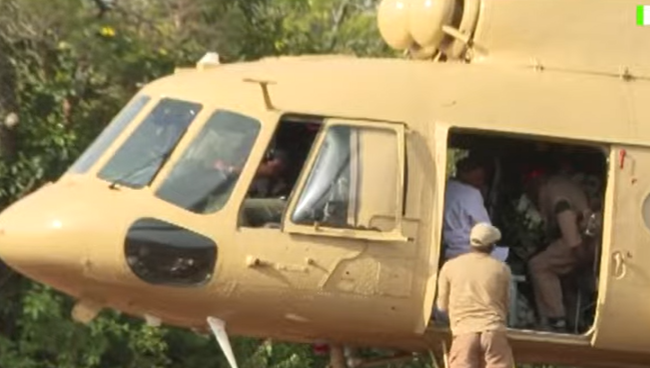The late former Prime Minister Raila Odinga has returned home. His body arrived in Bondo, Siaya County, on Saturday afternoon — a solemn moment that drew tears, songs, and prayers from thousands gathered to welcome him back.
At exactly 4:16 p.m., the helicopter carrying Raila’s casket touched down at Opoda Farm, his rural home. As the aircraft’s rotors slowed, the sound of vuvuzelas pierced the air. Mourners wailed openly, waving flags and ululating in grief and reverence for the man they affectionately called “Baba.”
The casket, draped in the Kenyan flag, was received by close family members and senior government officials. Raila’s body was airlifted from Kisumu’s Jomo Kenyatta International Stadium, where thousands of Kenyans had lined up since morning for public viewing.
Interior Principal Secretary Raymond Omollo confirmed that the decision to fly the body, rather than transport it by road as earlier planned, was made after consultations with the National Funeral Steering Committee and the Odinga family.
“The body of the former Prime Minister will be flown directly to Bondo,” Omollo said. “We want to make sure the transition from Kisumu to his home is done smoothly and respectfully.”
The arrival in Bondo marked the beginning of an overnight vigil before Raila’s burial on Sunday. The former Premier, who passed away in India on October 15, will be laid to rest beside his father, the late Jaramogi Oginga Odinga, at the family mausoleum in Kang’o ka Jaramogi.
Earlier in the day, Siaya Senator and Raila’s elder brother, Oburu Oginga, performed the traditional ceremony known as tero ywak pacho — “bringing the cry home” — formally opening the gates of the Odinga homestead to mourners.
Family sources confirmed that while initial plans had placed Raila’s final resting place next to his mother, Mary Odinga, the family later agreed he would be buried beside his father — a symbolic gesture linking two generations of Kenyan political history.
As dusk settled over Opoda, the mood was one of both sorrow and pride. Chants of “Baba! Baba!” rose from the crowd, mingling with hymns and traditional dirges.
For many in attendance, it was not just the end of a political era, but the closing of a chapter in Kenya’s collective story.

